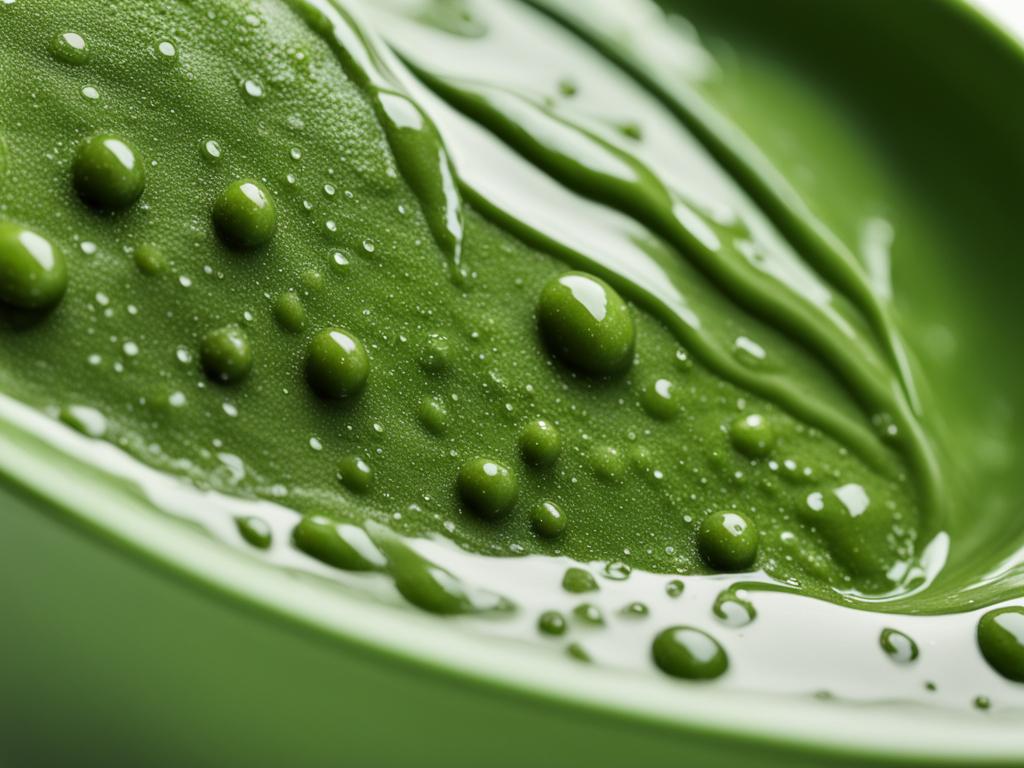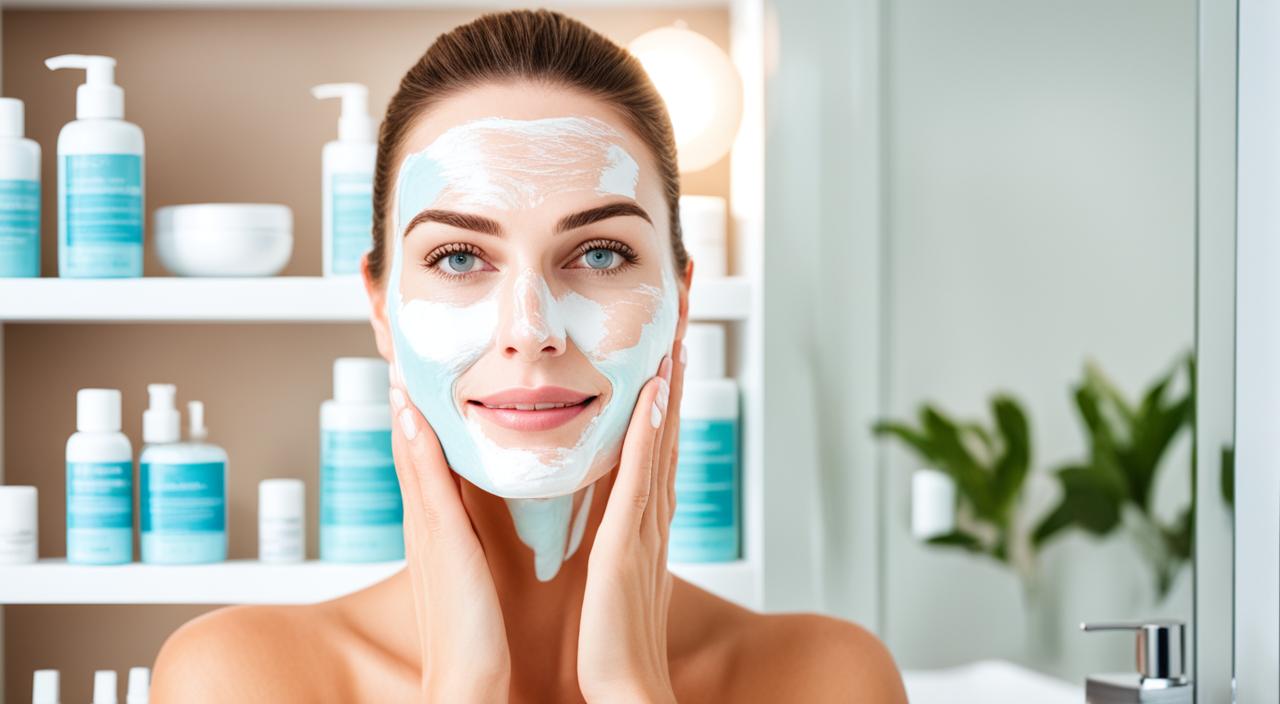Master Your Skincare Routine For Oily Skin With Our Guide

Oily skin can be a challenge to manage, but with the right skincare routine, you can effectively control excess oil and maintain a healthier complexion. In this guide, we will provide you with expert tips and a step-by-step skincare routine to help you master oily skin care. Whether you’re looking for the best skincare routine for oily skin or simply need oily skin care tips, we’ve got you covered.
Key Takeaways:
- Understanding the causes of oily skin can help you manage it more effectively.
- Incorporate tips like regular cleansing, lightweight moisturizers, and sunscreen into your daily skincare routine.
- Key ingredients like salicylic acid, niacinamide, and retinoids can help control excess oil production.
- Choosing the right products, like oil-free and non-comedogenic options, is crucial for oily skin care.
- Additional tips include practicing good skin hygiene and seeking personalized care from a dermatology provider.
Understanding Oily Skin and its Causes
Oily skin is a common skin type characterized by excess sebum production. This excess oil can give the skin a shiny appearance and contribute to issues such as enlarged pores and acne. To effectively manage oily skin, it’s important to understand its causes and how they impact the skin’s oil production.
One of the main causes of oily skin is the overproduction of sebum by the sebaceous glands. These glands are responsible for producing oil that helps moisturize and protect the skin. However, factors like genetics, hormones, environment, and lifestyle can influence the production of sebum, leading to oily skin.
Genetics play a significant role in determining skin type, including whether someone is prone to oily skin. Some individuals naturally produce more sebum than others, which can contribute to oily skin. Hormonal changes, particularly an increase in androgens, can also stimulate the sebaceous glands to produce more oil. Environmental factors like hot and humid weather can exacerbate oily skin, as the heat and humidity can increase sebum production.
In summary, oily skin is caused by a combination of genetic, hormonal, and environmental factors that influence the production of sebum. Understanding these causes can help individuals with oily skin implement effective skincare practices to manage excess oil and maintain a healthier complexion.
Tips to Control Excess Oil on Oily Skin
To control excess oil on oily skin, there are several tips you can incorporate into your skincare routine:
Cleansing:
Regular cleansing is essential to remove excess oil and dirt from the skin. Use a gentle, water-soluble cleanser twice a day to avoid stripping the skin of its natural oils.
Moisturizing:
Contrary to popular belief, oily skin still needs hydration. Opt for lightweight, oil-free moisturizers that won’t clog the pores. Look for products labeled specifically for oily skin to ensure they won’t exacerbate the oiliness.
Hydration:
Keeping the skin hydrated is important, even for oily skin. Drink enough water throughout the day to maintain overall skin health and prevent the skin from producing excess oil as a result of dehydration.
Sun Protection:
Don’t skip the sunscreen! Protecting your skin from the harmful UV rays is crucial, regardless of skin type. Choose a broad-spectrum sunscreen with at least SPF 30 and apply it daily, even on cloudy days.
Healthy Diet:
A balanced diet can also contribute to managing oily skin. Opt for foods rich in antioxidants, such as fruits and vegetables, and limit your intake of processed and fried foods. Avoid excessive consumption of dairy products, as they can contribute to oil production in some individuals.
Makeup and Products:
When choosing makeup and skincare products, opt for oil-free and non-comedogenic options. These products are specifically formulated to minimize clogged pores and reduce oiliness. Avoid heavy, greasy makeup that can worsen oil production.
By incorporating these tips into your daily skincare routine, you can effectively control excess oil on oily skin and maintain a healthier complexion.
Key Ingredients for Managing Oily Skin
When it comes to managing oily skin, certain key ingredients have proven to be effective in controlling excess oil production and promoting a balanced complexion. Incorporating these ingredients into your skincare routine can help you achieve healthier-looking skin. Let’s take a closer look at these key ingredients:
Salicylic Acid
Salicylic acid is a beta-hydroxy acid that works wonders for oily skin. It helps to reduce sebum secretion and clears out pore-clogging impurities. This ingredient is known for its exfoliating properties, helping to remove dead skin cells and unclog pores, which can contribute to oiliness and breakouts.
Niacinamide
Niacinamide, a form of vitamin B3, is another beneficial ingredient for managing oily skin. It can help lower sebum excretion rates, resulting in a more balanced complexion. Niacinamide also possesses anti-inflammatory properties, which can help reduce redness and irritation often associated with oily skin.
Clay
Clay, such as smectites and kaolin minerals, is well-known for its oil-absorbing capabilities. It works by absorbing excess oils and toxins from the skin’s surface, leaving it feeling fresh and matte. Clay masks or cleansers with clay as a key ingredient can be particularly effective in managing oily skin.
Retinoids
Derived from vitamin A, retinoids are a powerhouse ingredient for oily skin. They help suppress sebum production, minimize the appearance of pores, and promote a smoother skin texture. Incorporating retinoids into your skincare routine can help regulate oil production and improve overall skin clarity.
Green Tea Extract and Witch Hazel
Both green tea extract and witch hazel have shown promise in managing oily skin. Green tea extract possesses antioxidant and anti-inflammatory properties, which can help reduce sebum production. Witch hazel, on the other hand, acts as an astringent, tightening the skin and minimizing the appearance of pores. These ingredients can be found in toners or serums specially formulated for oily skin.

“Key ingredients like salicylic acid, niacinamide, clay, retinoids, green tea extract, and witch hazel can play a significant role in managing oily skin. These ingredients have been scientifically proven to control excess oil production, reduce pore size, and promote a balanced complexion. Incorporating products containing these ingredients into your skincare routine can help you achieve a healthier, shine-free complexion.”
Establishing a Skincare Routine for Oily Skin
To effectively manage oily skin, it is important to establish a daily skincare routine. Consistency is key in maintaining a balanced complexion and controlling excess oil. Here is a step-by-step guide to help you establish a skincare routine specifically tailored for oily skin:
Cleansing:
Start your skincare routine by cleansing your face twice a day using a mild, water-soluble facial cleanser. Look for cleansers specifically formulated for oily skin that can effectively remove excess oil and impurities without stripping the skin of its natural moisture.
Toning:
After cleansing, follow up with an alcohol-free toner. Toners can further remove any remaining impurities and help reduce the appearance of pores. Look for toners that contain ingredients like witch hazel or tea tree oil, known for their astringent properties.
Exfoliation:
Exfoliation is an essential step in managing oily skin. Incorporate a gentle exfoliant containing salicylic acid once or twice a week to remove dead skin cells and unclog pores. This can help prevent breakouts and promote a smoother complexion.
Moisturizing:
Contrary to popular belief, even oily skin needs moisturization. Opt for lightweight, oil-free moisturizers that can provide hydration without adding excess oil to the skin. Look for moisturizers that contain ingredients like hyaluronic acid or glycerin to help maintain the skin’s moisture balance.
Sun Protection:
Don’t forget to protect your skin from the damaging effects of the sun. Apply a broad-spectrum sunscreen with an SPF of 30 or higher every day, even on cloudy days. Look for oil-free and non-comedogenic formulas to avoid clogging pores.
By following this skincare routine consistently, you can effectively manage oily skin and achieve a healthier, more balanced complexion. Remember to listen to your skin’s needs and make adjustments to your routine as necessary.

Choosing the Right Products for Oily Skin
When it comes to managing oily skin, choosing the right skincare products is crucial. Opting for oil-free and non-comedogenic options can help maintain a balanced complexion and prevent clogged pores. These products are specifically formulated to avoid adding extra oil to the skin, making them ideal for individuals with oily skin.
To ensure you’re selecting the most suitable products for your oily skin, keep the following tips in mind:
- Look for oil-free cleansers: Cleansers that are free of oils and rich in gentle ingredients can effectively cleanse the skin without stripping away essential moisture.
- Consider non-comedogenic moisturizers: Moisturizers that are non-comedogenic won’t clog the pores, allowing the skin to breathe while providing necessary hydration.
- Avoid irritating ingredients: Check product labels for ingredients like menthol, mint, eucalyptus, lemon, and alcohol, as they can potentially irritate the skin and stimulate excess oil production.
- Choose light formulations: Opt for light liquids, serums, and gels instead of heavy lotions and creams, as these lighter formulations won’t block the pores or make the skin appear greasy.
By selecting oil-free and non-comedogenic products, you can help maintain a healthy, balanced complexion and effectively manage oily skin.

Additonal Tips for Managing Oily Skin
Managing oily skin requires more than just a skincare routine. Here are some additional tips to help you effectively control excess oil and maintain a healthier complexion:
Avoid Harsh Cleansers
While it’s important to cleanse your skin, using harsh cleansers can actually stimulate more oil production. Opt for gentle, non-stripping cleansers that can remove excess oil without disrupting the skin’s natural balance.
Blotting Papers
Carry oil-absorbing blotting papers with you throughout the day to quickly absorb excess oil without disrupting your makeup. Gently press the blotting paper against the oily areas of your skin for a quick touch-up.
Maintain a Healthy Diet
Your diet can play a role in the overall health of your skin. Avoid greasy and fried foods, as they can contribute to excess oil production. Instead, focus on incorporating fruits, vegetables, and lean proteins into your diet, which can help maintain normal oil levels in the skin.
Avoid Touching Your Face
Minimize touching your face throughout the day to prevent transferring oil and dirt onto your skin. The bacteria from your hands can clog pores and lead to breakouts. If you must touch your face, make sure your hands are clean or use a tissue as a barrier.
By incorporating these additional tips into your skincare routine, you can effectively manage oily skin and maintain a balanced complexion. Remember, everyone’s skin is unique, so it may take some trial and error to find the strategies that work best for you. Stay consistent with your routine and be patient, as achieving healthy, balanced skin takes time and dedication.

Personalized Care for Oily Skin
When it comes to managing oily skin, a personalized skincare routine can make all the difference. By seeking guidance from a dermatology provider, you can receive tailored recommendations and create a custom routine that addresses your specific skin concerns. This personalized care ensures that you are using the right products and active ingredients to effectively manage oily skin and promote a healthy, balanced complexion.
Working with a dermatology provider allows for a comprehensive evaluation of your skin type, concerns, and goals. They can analyze factors such as sebum production, pore size, and skin sensitivity to determine the most suitable products and treatments for your oily skin. Their expertise and knowledge will help you craft a customized routine that addresses your unique needs.
With personalized care, you can incorporate active ingredients like salicylic acid, niacinamide, and retinoids into your skincare routine. These ingredients have been specifically proven to help manage oily skin and reduce excess oil production. By using products that are tailored to your skin’s needs, you can achieve better results and maintain a healthier complexion.

Remember, everyone’s skin is different, and what works for one person may not work for another. Consulting a dermatology provider allows you to receive individualized recommendations and expert advice that takes into account your unique skin characteristics. With a personalized skincare routine, you can gain control over your oily skin and embrace a healthier, more balanced complexion.
Also Read: 10 Skincare Ingredients You Should Incorporate Into Your Routine
Conclusion
The best skin care routine for oily skin
The best skin care routine for oily skin requires a thoughtful approach to balance and manage excess give your skin sebum production. To start, cleansing is crucial. Opt for a gentle, oil-free cleanser to remove dirt and impurities help the skin without sensitive skin oily skin tends skin type even skin tone overstripping cerave the skin’s natural oils. Exfoliation morning and night treatment for oily skin combination skin may skin should be a regular part of your routine to prevent fine lines clogged pores and breakouts. Choose moisture to oily skin slough off dead skin cells people with oily skin a salicylic acid-based exfoliant to effectively unclog tips for oily skin pores even if your skin and control oil.
Lightweight oil-free moisturizer with SPF
A lightweight, oil-free moisturizer with SPF is an excellent choice for those looking to streamline their skincare routine while ensuring sun protection. These multifunctional products offer hydration without adding excess oil to the skin, making them particularly suitable for individuals with oily or acne-prone skin. The oil-free formulation american academy of dermatology helps prevent clogged pores and breakouts, while the inclusion of SPF provides essential protection against harmful UV rays. It’s a convenient way to moisturize and shield your skin from sun damage, making it an essential step in any daily skincare regimen, especially in sunny or outdoor environments.
Conclusion
In conclusion, managing oily skin requires a dedicated skincare routine tailored to your specific needs. By following the expert tips and step-by-step guide provided, you can effectively control excess oil, reduce breakouts, and achieve a healthier, more balanced complexion. Consistency is key when it comes to managing oily skin, so it’s important to stay committed to your routine.
Remember to cleanse your skin regularly to remove excess oil and dirt, and opt for lightweight, oil-free products that won’t clog your pores. Incorporate key ingredients like salicylic acid, niacinamide, and retinoids into your skincare routine to help regulate sebum production and minimize the appearance of pores. And don’t forget to protect your skin from sun damage by applying a broad-spectrum sunscreen every day.
If you find that your oily skin requires additional attention, consider seeking personalized care from a dermatology provider. They can offer tailored recommendations and create a custom skincare routine specifically for your oily skin needs. With the right skincare routine and personalized care, you can achieve a balanced and healthier complexion.
So, take control of your oily skin today and start your journey towards a more balanced and confident you!
FAQs
Q: What is the best skincare routine for oily skin?
A: The best skincare routine for oily skin includes cleansing, toning, moisturizing, and using products specifically formulated for oily skin. It’s important to use oil-free and non-comedogenic products to avoid clogging pores.
Q: How often should I moisturize if I have oily skin?
A: Even oily skin needs to be moisturized, but you can opt for a lightweight, oil-free moisturizer and apply it twice a day, in the morning and evening, to keep your skin hydrated without feeling greasy.
Q: What ingredients should I look for in products for oily skin?
A: Look for products containing ingredients like salicylic acid, benzoyl peroxide, hyaluronic acid, and niacinamide, as they help control oil production, unclog pores, and provide hydration without adding excess oil.
Q: How can I create a skincare regimen for oily skin?
A: Start with a gentle cleanser, followed by a toner to help remove excess oil. Then, use a lightweight, oil-free moisturizer and finish with a non-comedogenic sunscreen during the day. Incorporate exfoliation and masks 1-2 times a week.
Q: What are some tips for managing oily skin?
A: Always use non-comedogenic products, avoid over-cleansing, and gently exfoliate to prevent excess oil production. It’s also important to stay hydrated, eat a balanced diet, and manage stress, as these factors can affect oil production.
Q: Should I see a dermatologist for my oily skin?
A: If you’re struggling to manage your oily skin or experiencing severe acne, it’s advisable to seek the advice of a board-certified dermatologist who can provide personalized treatment and recommend suitable skincare products.
Q: What are the best skincare products for oily skin?
A: Some of the best skincare products for oily skin include oil-free moisturizers, gel-based cleansers, mattifying primers, and oil-absorbing masks. Look for products labeled specifically for oily or acne-prone skin.
Q: How can I manage both oily and acne-prone skin?
A: You can manage both oily and acne-prone skin by using gentle, non-drying products, incorporating salicylic acid or benzoyl peroxide for acne treatment, and maintaining a consistent skincare routine tailored for both concerns.
Q: Is it important to hydrate oily skin?
A: Yes, it’s essential to hydrate oily skin to maintain its overall health and balance. Using lightweight, oil-free moisturizers and hydrating serums can help keep oily skin hydrated without adding unnecessary oil.
Q: How can I prevent excess oil and shine on my skin?
A: To prevent excess oil and shine, choose oil-free and mattifying products, use blotting papers throughout the day, and consider incorporating clay masks or oil-absorbing powders into your skincare routine.





